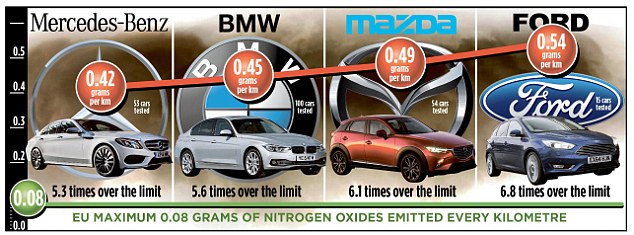This was stated yesterday, I believe.
A number of Mazdas stakeholders have expressed concern as a result of the emissions scandal involving Volkswagens diesel vehicles in North America. Mazda would like to take this opportunity to give its view on this issue.
In compliance with the law, Mazda develops hardware and control software for both diesel and gasoline-powered vehicles in order to meet the regulations and standards of each country.
Mazda uses essentially the same system throughout the world, but some countries, like those in North America, have special regulations and modes due to differences in traffic flow. In these cases, Mazda may add hardware or software to meet regulations, always being careful to fully comply with the law.
Mazda's customers may rest assured that all of the company's vehicles are in full compliance with regulations.
Media reports on this issue have identified the following two problems as the reasons for emission levels being higher in real-world driving than they are when testing for certification.
1) The use of illegal software
2) Differences in driving modes* when testing and in real-world driving situations
* Vehicle speed, engine speed, slope inclination angle, engine temperature, etc.
In the first case, the computer program somehow detects that the engine is being tested and sacrifices fuel efficiency and driving performance in order to reduce emissions. Such a process is an infringement of the law.
In this situation, the illegal software does not operate during normal driving, resulting in a significant deterioration in emissions compared to when testing.
The authorities have accused Volkswagen of using such software. Mazda has never used such illegal software.
The second problem is caused by the difference between driving modes under testing and in real-world driving. Driving modes for homologation tests are established by the authorities in consideration of the characteristics of traffic flow in each country. When a vehicle is driven in the real world, it is possible for vehicle and engine speeds (rpm) to exceed those during testing. Also, the driver may brake and accelerate more frequently, and ascend steeper slopes than is done during testing. All of these factors will increase engine emissions.
This is the same reason there is a difference between catalogue fuel economy figures and those achieved in the real world. The principle applies to vehicles of any type, including diesel, gasoline and hybrid-powered vehicles, and in all regions.
In order to solve this problem, it is necessary to make the driving modes for homologation test as close as possible to real world driving. Authorities in each country are considering reviewing driving modes for testing, such as Worldwide harmonized Light duty Test Cycle (WLTC) and Real Driving Emissions (RDE).
As a carmaker, Mazda has a duty to continue developing technologies that enable it to comply with regulations tested by driving modes determined by the authorities, and to reduce emission volumes as much as possible during real-world driving. Mazda has always been aware of this responsibility and will continue to be aware of it in the future."
A number of Mazdas stakeholders have expressed concern as a result of the emissions scandal involving Volkswagens diesel vehicles in North America. Mazda would like to take this opportunity to give its view on this issue.
In compliance with the law, Mazda develops hardware and control software for both diesel and gasoline-powered vehicles in order to meet the regulations and standards of each country.
Mazda uses essentially the same system throughout the world, but some countries, like those in North America, have special regulations and modes due to differences in traffic flow. In these cases, Mazda may add hardware or software to meet regulations, always being careful to fully comply with the law.
Mazda's customers may rest assured that all of the company's vehicles are in full compliance with regulations.
Media reports on this issue have identified the following two problems as the reasons for emission levels being higher in real-world driving than they are when testing for certification.
1) The use of illegal software
2) Differences in driving modes* when testing and in real-world driving situations
* Vehicle speed, engine speed, slope inclination angle, engine temperature, etc.
In the first case, the computer program somehow detects that the engine is being tested and sacrifices fuel efficiency and driving performance in order to reduce emissions. Such a process is an infringement of the law.
In this situation, the illegal software does not operate during normal driving, resulting in a significant deterioration in emissions compared to when testing.
The authorities have accused Volkswagen of using such software. Mazda has never used such illegal software.
The second problem is caused by the difference between driving modes under testing and in real-world driving. Driving modes for homologation tests are established by the authorities in consideration of the characteristics of traffic flow in each country. When a vehicle is driven in the real world, it is possible for vehicle and engine speeds (rpm) to exceed those during testing. Also, the driver may brake and accelerate more frequently, and ascend steeper slopes than is done during testing. All of these factors will increase engine emissions.
This is the same reason there is a difference between catalogue fuel economy figures and those achieved in the real world. The principle applies to vehicles of any type, including diesel, gasoline and hybrid-powered vehicles, and in all regions.
In order to solve this problem, it is necessary to make the driving modes for homologation test as close as possible to real world driving. Authorities in each country are considering reviewing driving modes for testing, such as Worldwide harmonized Light duty Test Cycle (WLTC) and Real Driving Emissions (RDE).
As a carmaker, Mazda has a duty to continue developing technologies that enable it to comply with regulations tested by driving modes determined by the authorities, and to reduce emission volumes as much as possible during real-world driving. Mazda has always been aware of this responsibility and will continue to be aware of it in the future."



